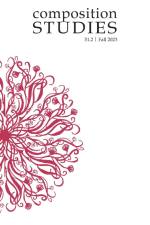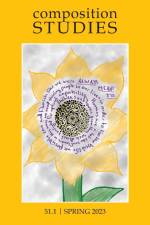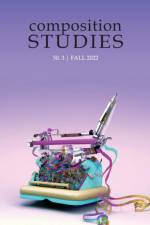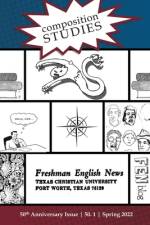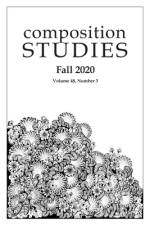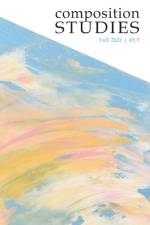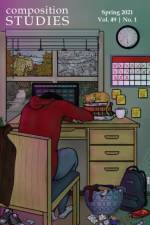von Matt Davis
30,00 €
The oldest independent periodical in the field, COMPOSITION STUDIES publishes original articles relevant to rhetoric and composition, including those that address teaching college writing; theorizing rhetoric and composing; administering writing programs; and, among other topics, preparing the field's future teacher-scholars. All perspectives and topics of general interest to the profession are welcome. We also publish Course Designs, which contextualize, theorize, and reflect on the content and pedagogy of a course. Contributions to Composing With are invited by the editor, though queries are welcome. CONTENTS OF 50.3 (Fall 2022): From the Editors: A Three-Year Check-In | AT A GLANCE: Myth-Checking in Complandia: The Dispositions of Try This by Jennifer Clary-Lemon, Derek Mueller, and Kate Pantelides | ARTICLES | Interrogating the Four Ps: Positionality, Privilege, Power, and Professionalism in the Rhetoric and Composition Job Market by Chen Chen, Dev K. Bose, Jennifer Sano-Franchini, Elizabeth Keller Kirycki, Ruth D. Osorio, and Elliot Tetreault | Unlike Conventional Form(s) Of: Beyond Reparative Antiracism by Louis M. Maraj | Teaching During a Pandemic: A Study of Instructors' Preparedness for Online Composition Delivery by Pam Lieske, Ana Wetzl, and Mahli Xuan Mechenbier | "Expanding Communicative Possibilities" in the Public Writing Classroom by Alisa Russell | COURSE DESIGNS | WRD 110 - Composition and Communication I: Researching Oral Histories of the University of Kentucky by Jannell McConnell Parsons, Kathryn Kohls, Shelby Roberts, Joshua McConnell Parsons, and Jim Ridolfo | Incorporating Black Life, History, and Culture (BLHAC) in English Composition 101 at an HBCU by Nathaniel Norment, Jr. | WHERE WE ARE: DISCOURSES OF CRISIS IN RHETORIC AND COMPOSITION: Fakers and Takers: Disrespect, Crisis, and Inherited Whiteness in Rhetoric-Composition Studies by Carmen Kynard | Queering Crisis: Hope for an Alternative Academy by William P. Banks | Dizzying Up the Discipline by Ryan Skinnell | A Long-Term Crisis: Peak Graduate Programs and Market Contraction by Jim Ridolfo | A Historical and Cultural Rendering of the Rhetoric of Disciplinary Crisis by Cedric D. Burrows | The AI "Crisis" and A (Re)turn To Pedagogy by Sandra Jamieson | REVIEW ESSAY | New Histories and Theories of Writing with/through Technologies: A Review Essay by Gavin P. Johnson and G. Edzordzi Agbozo | Are We There Yet? Computers and the Teaching of Writing in American Higher Education-Twenty Years Later, by Jennifer Marlow and James P. Purdy | Video Scholarship and Screen Composing, by Daniel Anderson | 100 Years of New Media Pedagogy, by Jason Palmeri and Ben McCorkle | BOOK REVIEWS: Writing Rhetorically: Fostering Responsive Thinkers and Communicators, by Jennifer Fletcher Reviewed by Suzanne Bordelon | Self+Culture+Writing: Autoethnography for/as Writing Studies, edited by Rebecca Jackson and Jackie Grutsch McKinney Reviewed by Erick Raven | Storytelling in Queer Appalachia: Imagining and Writing the Unspeakable Other, edited by Hillary Glasby, Sherrie Gradin, and Rachael Ryerson Reviewed by Tyler J. Martinez | Community Is the Way: Engaged Writing and Designing for Transformative Change, by Aimée Knight Reviewed by Jainab Tabassum Banu | Translingual Pedagogical Perspectives: Engaging Domestic and International Students in the Composition Classroom, edited by Julia Kiernan, Alanna Frost, and Suzanne Blum Malley Reviewed by Andres Altamirano | Beyond Progress in the Prison Classroom: Options and Opportunities, by Anna Plemons Reviewed by Rae Haight | On Teacher Neutrality: Politics, Praxis, and Performativity, edited by Daniel P. Richards | Reviewed by Kaustav Mukherjee | Transfer Across Media: Using Digital Video in the Teaching of Writing, by Crystal Van Kooten Reviewed by Shreelina Ghosh | Black Madness :: Mad Blackness, by Therí Alyce Pickens Reviewed by Kimberly A. Bain | CONTRIBUTORS

